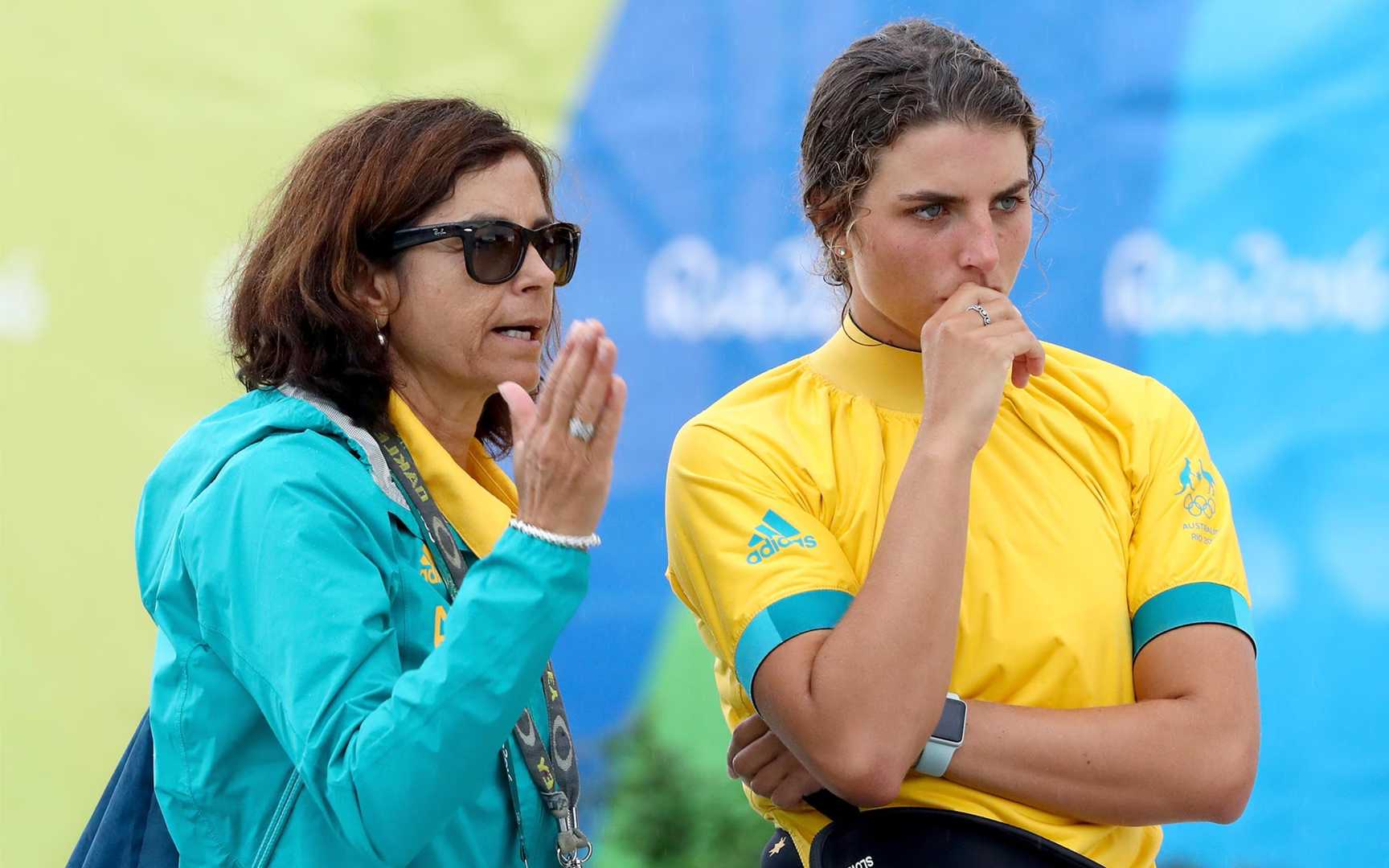They are often behind the scenes, on the sidelines, and rarely in the headlines. Yet, their role is right at the heart of sport. On International Women’s Day, we are celebrating female coaches who are paving the way for future generations.
The International Olympic Committee (IOC) and the Olympic Movement have worked hard for the Olympic Games to become the largest gender-equal sporting event in the world. At the Olympic Games Tokyo 2020, women accounted for 48 per cent of athletes, and Paris 2024 will make history as the first Olympic Games to have full gender equality in terms of athletes.
“For young women out there that want to coach, and want to work at the highest level, it’s much easier to envision that if they see somebody else doing it,” says Canada’s Karin Harjo, the first woman to coach an Alpine ski team.
“I tell women all the time: Ask the question, why not me?”
The IOC is committed to addressing the challenge and to supporting Olympic Movement stakeholders to find pathways for more women to reach the highest levels of coaching. Increasing the visibility of elite coaches who have broken those barriers and who are role models for more women to follow their lead is itself a goal.
 Getty Images / Valerie Grenier (L) with Karin Harjo (R)
Getty Images / Valerie Grenier (L) with Karin Harjo (R)
“I think it’s important for female athletes to see that you don’t necessarily have to be a male to go into coaching,” says Andrea Bednas, a snowboard coach from the Netherlands. “There is a path that you can take.”
“The more women we have, the more women think they can go into these jobs and it’s okay to be a coach, and it’s okay because there’s a door open for them to become a coach,” says Myriam Fox-Jerusalmi, an Olympic medallist and canoe coach from Australia who was honoured with the IOC 2022 Coaches Lifetime Achievement Award, recognising coaches who have dedicated their lives to their athletes.

TACKLING THE OBSTACLES TO EQUALITY Rising slowly from a low base, the proportion of female elite coaches at the Olympic Games has been around only 10 per cent over the past decade. The challenge starts already at grassroots level, with fewer girls and women choosing to take on coaching roles.
This unfortunately reinforces the gender gap, because if a sports club has only male coaches, girls will not see the possibility of becoming a coach as an option. A career in coaching typically consists of 10-12 years’ experience at national level in regional competitions before reaching Olympic level. This in part explains why the process of becoming a coach is much slower than that of becoming an elite athlete.

In addition, there are still a number of obstacles that make it harder for women to become coaches. Katie Allen, an Olympic hockey player from Australia now coaching a top-tier men’s team in Spain, says that self-doubt is often a major obstacle. She says women must focus on the ultimate goal of doing something that interests them and push through any discomfort. “You’ve got to open yourself to feeling those doubts… (but) be bold, and don’t succumb to the worries,” she says, adding that clubs and organisations must do more to find women coaches. “(It is) about an openness of teams or clubs or organisations to look more broadly and look at who are – across both genders and different countries and states – the best people we can look for,” Katie says.
At the same time, more and more athletes are experiencing the benefits of a woman coach. In an OpEd published on International Women’s Day 2020, British tennis star and two-time Olympic champion Andy Murray shared his views on the role that women, including his former coach, Amélie Mauresmo, have played throughout his career. “When it comes to mindset, skillset and intelligence, there’s no reason why a woman can’t be just as good as a man, and hopefully things will change when women are given more opportunities.”

As a former Olympic gymnast, Cecile Landi has unique insights into coaching women and girls. Currently coaching US gymnast Olympic champion Simone Biles, she thinks that women are finally getting the attention they deserve. “It’s shifting in the right direction because women are breaking boundaries and records,” she says. “But you know, it could always be better.”
WISH PROGRAMME LIFE-CHANGING EXPERIENCE The IOC is committed to working on creating pathways for female coaches, from grassroots up to elite level. WISH – the Women in Sport High-performance pathway programme – is a key element of its response. This four-year programme funded by Olympic Solidarity aims to equip over 100 women for coaching at elite levels by 2024.
Representing 17 sports and 53 countries, the 97 coaches who have enrolled in the programme to date were selected for the course by their International Federations (IFs) and National Olympic Committees (NOCs) on the basis of their individual achievements, potential and ambition.
The programme is designed to help female coaches develop their leadership skills, confidence and careers. Mentoring is also a very important part of the programme. Coaches benefit from one-to-one leadership mentoring plus ongoing support from a sport-specific mentor. Such expert advice and feedback on real-life challenges can be invaluable to any coach, let alone a woman striving to perform at the top of her game in a male-dominated environment.

For many of the participants, the WISH programme has been life-changing. “Thanks to this [the WISH programme]), you can meet people from different disciplines, and learn from their path and their experience,” says Anna Wiese, a cycling coach from Poland.
Kristina Sue, a rugby coach from New Zealand, says the programme allows participants to identify and develop their strengths and weaknesses. “It allows us to reflect deeply on ourselves and the key competencies or leadership areas that are our strengths and what we need to work on. Without a programme like this, we wouldn’t have access to the resources,” she says.
CREATING AN ENVIRONMENT FOR WOMEN TO THRIVE Driven by its vision to build a better world through sport, the IOC sees gender equality as a must-have for every organisation and every country. In October last year, IOC President Thomas Bach told Olympic Movement stakeholders that all sports organisations – including the IOC – have a responsibility to advance gender equality, diversity and inclusion. “No organisation or country can afford to leave the skills of 50 per cent of the population behind,” he said at the time.
Global challenges such as the COVID-19 pandemic, violent conflict, climate change, and the backlash against women’s rights are further exacerbating disparities, the United Nations says.
Against this backdrop, the IOC has made progress on and off the field of play and has set up an ambitious work plan for 2021 to 2024 which focuses on five key areas: participation, safe sport, portrayal, resource allocation, and leadership.
Setting out the objective of increasing the number of female coaches across all Olympic sports is clearly part of that plan. “Growing up, I know I personally never had anyone to aspire to, even to this day, there are not very many women coaches out there”, says Carissa Holland, a wrestling coach from Australia. “So for young girls and young women, to see that there are girls in that position and things like that are possible, the future is ours”.
Credit: AIPS Media


